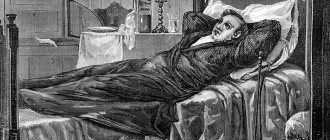Reasons for doing nothing
Have you ever fallen into a state of apathy? Or maybe it’s been impossible to move one of your loved ones off the couch for several years now? The cause of such a personality change may be an endogenous disease, which ultimately leads to disability.
In our time, it would be difficult to “feed” a man who has not worked for so long, like the hero of the novel “Oblomov.” He would probably have been given a second disability group for mental illness.
The origin of "Oblomovism"
A look at the theme of the novel is as follows: Oblomov is an ordinary lazy white-handed gentleman who cannot do anything normally without the support of his servant Zakhar . Actually, what did the creator find so catastrophic in the hero’s life? Of course, these were dreams that would never have come true for a person like Oblomov.
He was an incredibly lazy person; he could lie in bed all day without even getting out of it. And everything flows past his nose, like film frames. Also, love does not have the ability to change this established order.
After the chapter “Oblomov’s Dream,” it becomes clear what has brought the boy to the state of a “plant” that is only looked after, but which itself does not move at all. It was precisely because of this upbringing that Ilya never learned to solve his problems throughout his entire life. He tried to shift all kinds of problems onto Agafya Matveevna’s brother, who soon began managing the estate, or onto Zakhar. He was already used to this, it was easier for him to do all this. He failed to learn the most important thing, which would undoubtedly have helped him in everyday life - work.
How to recognize the first signs of the disease?
The novel well describes the dynamics of the primary mental “shift”. The schizoid personality of Ilya Ilyich increased gradually and was accompanied by neurosis-like hypochondriacal inclusions.
How did this manifest itself? Inappropriate anxiety and expectation of danger “from everything that was not encountered in the sphere of his daily existence.” And if at first “all anxiety was resolved with a sigh and died away in apathy or drowsiness,” then later the fears began to acquire a clearly psychotic character.
It is interesting to note that such psychopathological phenomena as loss of interest in the environment and various phobias were largely copied by the author, Ivan Goncharov, from himself.
Can falling in love return you to normal life?
Even such a powerful psychohormonal stimulus as falling in love was unable to change the already pathologically disturbed personality of our hero.
The charm of Olga Ilyinskaya transformed Oblomov only for a while. “He gets up at seven o’clock, reads, carries books somewhere. There is no sleep, no fatigue, no boredom on his face... He comes out in a perfectly tailored frock coat, in a smart hat... He is cheerful, humming..."
It would seem that a little more and the relationship with the woman he loves will return the hero to normal life. But Oblomov quickly gets tired of the activity that the active Olga devotes herself to.
He is again dominated by ideas of his own inferiority: “No, this cannot be! – he said out loud, getting up from the sofa and walking around the room. - To love me, funny, with a sleepy look, with flabby cheeks... She keeps laughing at me... He looked in the mirror again. “They don’t like people like that!” In the end, Olga realizes the futility of her efforts.
Having broken off relations with the charming Olga Ilyinskaya, our hero enters into a prosaic relationship with housewife Agafya Matveevna, and they have a child. A few years later, Ilya Ilyich dies from a repeated cerebral hemorrhage.
Daydreaming as the cause of Oblomov’s degradation
I. A. Goncharov’s novel “Oblomov” depicts to us the entire life of the main character.
This life, of course, cannot be called interesting. No life events decorate the empty and monotonous existence of Ilya Ilyich Oblomov. The main character, with his entire lifestyle, shows how the best feelings and aspirations in a person can slowly die. Understanding and realizing this is sometimes difficult. However, precisely in order to make the image of the main character more understandable for readers, Goncharov cites the magnificent episode “Oblomov’s Dream” in the novel. This episode is of great importance. “Oblomov’s Dream” can well be considered as an independent work of art. The novel “Oblomov” without this episode would have been “unfinished,” as A.V. Druzhinin testifies. The main character is slowly deteriorating. Why? The author, apparently, was well aware that the reader might be confused, because it is not so easy to understand the personality of the main character. And that is why “Oblomov’s Dream” was created. In a dream, the main character sees his entire previous life, as if returning to the family’s ancestral estate - the village of Oblomovka. Life in this village resembles some kind of enchanted kingdom. This is a frozen world in which any non-compliance with existing rules causes fear and hostility. In the village of Oblomovka, everything flows according to routine. The only “worthy” activity in the village of Oblomovka is eating and sleeping. “Food” includes both its preparation and consumption. Laziness and apathy reign in the estate; everything around does not arouse the slightest interest. We learn that Oblomov’s father started every day the same way as yesterday. The only thing that occupied Ilyusha’s father in the morning was watching what was happening in the yard. Ilya’s mother spent three hours arguing with Averka, the tailor, about how to change Ilya’s jacket from her husband’s sweatshirt. Her activities were as follows: give tasks to the servants, how much lace needs to be woven; take a walk in the garden, watch the ripening of apples. However, all these “activities” were not main, but secondary. The main thing was to take care of preparing dinner. “The whole house discussed dinner.” After lunch everyone slept. In the village of Oblomovka, people had absolutely no interests. A person’s childhood is the best time, but the childhood of little Ilya Oblomov can hardly be called such. The boy grows up in the atmosphere of a sleepy kingdom; he sees that adults are not interested in anything, do not strive for anything. The child quickly adopts all the habits of adults. It is no wonder that the adult Ilya Oblomov began to live the same way as the others lived on his family estate. As a child, little Ilya was forbidden to do absolutely everything. This was not done out of the despotism of the parents or their desire to infringe on the rights of the child. On the contrary, parents and everyone around them tried to protect little Ilyusha from everything that could harm him. Over time, kind and gentle. By nature, the boy got used to this state of affairs, it began to suit him completely. If a person has nothing to strive for, he inevitably begins to fade away. There is nothing worse than inaction; this causes both mental and physical strength to be lost. The adult Oblomov fully “corresponds” to the model of behavior that was embedded in his consciousness by childhood impressions. In a dream, Oblomov sees not only his early childhood. When Ilyusha gets older, the nanny often tells him fairy tales. Fairy tales are the same dream, fiction. The fairy-tale world does not coincide with reality. But Ilyusha, accustomed since childhood to do nothing, listens to fairy tales with great pleasure. After all, fairy tales give him at least some interest and allow him to “decorate” his life a little with wonderful fiction. Fictional stories gradually fill almost the entire inner world of Ilyusha, beginning to replace reality. No wonder that as an adult. Oblomov remembers fairy tales with longing. “The adult Ilya Ilyich, although he later learns that there are no honey and milk rivers, no good sorceresses, although he jokes with a smile at his nanny’s stories, but this smile is insincere, it is accompanied by a secret sigh: his fairy tale is mixed with life, and he sometimes he is helplessly sad, why is a fairy tale not life, and why is life not a fairy tale. Everything pulls him in that direction, where they only know that they are walking, where there are no worries and sorrows; he always has the disposition to lie on the stove, walk around in a ready-made, unearned dress and eat at the expense of the good sorceress.” It is not surprising that the adult Oblomov perceives work as something unpleasant and dreary. But inaction and daydreaming are extremely desirable for Oblomov. He enjoys doing nothing, he is satisfied with an empty, meaningless life, devoid of effective actions. Because, paradoxically, it is in her that he sees the meaning of his existence. From Oblomov's dream we learn that his parents dreamed of a good future for their Ilyusha. They would like him to be a councilor in the House or a governor. But, above all, the parents would like their son to overcome all the difficulties that would inevitably come his way. They wanted Ilyusha to study “lightly”, so that he would get a certificate in which it would be written that he “passed all the sciences and arts.” The dreams of Oblomov’s parents are ridiculous, worthy of contempt and condemnation. We understand perfectly well that the environment in which Oblomov grew up was the reason for his degradation. Limited parents did not understand the simple truth that nothing in life comes without some effort. The parents sought to protect their adored child from all sorts of downs, not realizing that they were thereby depriving their son of the possibility of ups. Dreams in themselves are not a bad thing. But in the case of Oblomov, fantasies are the only substitute for real activity, so Oblomov’s dreams are perceived by us as a negative phenomenon. Oblomov’s dream allows us to better understand the reason for the appearance of such qualities in the main character as indifference to life, apathy, and extreme phlegmatism. It is for this reason that the dream episode is so important in the novel.
Depression develops gradually
In the image of Ilya Oblomov, one can note clear symptoms of a depressive state. These are ideas of self-deprecation, self-blame, psychopathic manifestations of depression.
Progressive disturbances in the emotional and volitional spheres allow us to call the described picture apathetic depression.
Ilya Oblomov’s intelligence does not suffer, as often happens with such disorders. But for the hero, “there was a whole abyss between science and life, which he did not try to cross and did not extract any practical juice for life. His life was on its own, and his science was on its own.”
We can talk about fruitless fantasizing in autistic thinking. The pathological change in personality also corresponds to the hero’s social decline along the “social ladder,” an increase in infantile traits and separation from reality.
In conditions of a psychotraumatic situation, ideas of relation arise, which already indicate a violation in the sphere of thinking. “There, there, these dandies are looking at me, then at Olga’s box!.. the dandies seem to be laughing, looking at me... Lord, Lord!” The described scene is already a manifestation of paranoid syndrome.
It is interesting to note that the author’s sympathy always remains on the side of the couch potato Oblomov, even in the latter’s most unpopular actions. Goncharov will always emphasize his positive traits: “he is more valuable than any mind: an honest, faithful heart!”
And this is not surprising: some of Ilya Ilyich’s psychotic disorders were not much different from the psychotic disorders of Ivan Goncharov himself.
classreferat.ru
I. A. Goncharov’s novel “Oblomov” depicts to us the entire life of the main character. This life, of course, cannot be called interesting. No life events decorate the empty and monotonous existence of Ilya Ilyich Oblomov. The main character, with his entire lifestyle, shows how the best feelings and aspirations in a person can slowly die. Understanding and realizing this is sometimes difficult. However, precisely in order to make the image of the main character more understandable for readers, Goncharov cites in the novel the magnificent episode “Oblomov’s Dream.” This episode is of great importance. “Oblomov’s Dream” can well be considered as an independent work of art. The novel “Oblomov” without this episode would have been “unfinished,” as A.V. Druzhinin testifies. The main character is slowly deteriorating. Why? The author, apparently, was well aware that the reader might be confused, because it is not so easy to understand the personality of the main character. And that is why “Oblomov’s Dream” was created. In a dream, the main character sees his entire previous life, as if returning to the family’s ancestral estate - the village of Oblomovka. Life in this village resembles some kind of enchanted kingdom. This is a frozen world in which any non-compliance with existing rules causes fear and hostility. In the village of Oblomovka, everything flows according to routine. The only “worthy” activity in the village of Oblomovka is eating and sleeping. “Food” includes both its preparation and consumption. Laziness and apathy reign in the estate; everything around does not arouse the slightest interest. We learn that Oblomov’s father started every day the same way as yesterday. The only thing that occupied Ilyusha’s father in the morning was watching what was happening in the yard. Ilya’s mother spent three hours arguing with Averka, the tailor, about how to change Ilya’s jacket from her husband’s sweatshirt. Her activities were as follows: give tasks to the servants, how much lace needs to be woven; take a walk in the garden, watch the ripening of apples. However, all these “activities” were not main, but secondary. The main thing was to take care of preparing dinner. “The whole house discussed dinner.” After lunch everyone slept. In the village of Oblomovka, people had absolutely no interests. A person’s childhood is the best time, but the childhood of little Ilya Oblomov can hardly be called such. The boy grows up in the atmosphere of a sleepy kingdom; he sees that adults are not interested in anything, do not strive for anything. The child quickly adopts all the habits of adults. It is no wonder that the adult Ilya Oblomov began to live the same way as the others lived on his family estate. As a child, little Ilya was forbidden to do absolutely everything. This was not done out of the despotism of the parents or their desire to infringe on the rights of the child. On the contrary, parents and everyone around them tried to protect little Ilyusha from everything that could harm him. Over time, kind and gentle. By nature, the boy got used to this state of affairs, it began to suit him completely. If a person has nothing to strive for, he inevitably begins to fade away. There is nothing worse than inaction; this causes both mental and physical strength to be lost. The adult Oblomov fully “corresponds” to the model of behavior that was embedded in his consciousness by childhood impressions. In a dream, Oblomov sees not only his early childhood. When Ilyusha gets older, the nanny often tells him fairy tales. Fairy tales are the same dream, fiction. The fairy-tale world does not coincide with reality. But Ilyusha, accustomed since childhood to do nothing, listens to fairy tales with great pleasure. After all, fairy tales give him at least some interest and allow him to “decorate” his life a little with wonderful fiction. Fictional stories gradually fill almost the entire inner world of Ilyusha, beginning to replace reality. No wonder that as an adult. Oblomov remembers fairy tales with longing. “The adult Ilya Ilyich, although he later learns that there are no honey and milk rivers, no good sorceresses, although he jokes with a smile at his nanny’s stories, but this smile is insincere, it is accompanied by a secret sigh: his fairy tale is mixed with life, and he sometimes he is helplessly sad, why is a fairy tale not life, and why is life not a fairy tale. Everything pulls him in that direction, where they only know that they are walking, where there are no worries and sorrows; he always has the disposition to lie on the stove, walk around in a ready-made, unearned dress and eat at the expense of the good sorceress.” It is not surprising that an adult Oblomov perceives work as something unpleasant, dreary... But inaction and daydreaming are extremely desirable for Oblomov. He enjoys doing nothing, he is satisfied with an empty, meaningless life, devoid of effective actions. Because, paradoxically, it is in her that he sees the meaning of his existence. From Oblomov's dream we learn that his parents dreamed of a good future for their Ilyusha. They would like him to be a councilor in the House or a governor. But, above all, the parents would like their son to overcome all the difficulties that would inevitably come his way. They wanted Ilyusha to study “lightly”, so that he would get a certificate in which it would be written that he “passed all the sciences and arts.” The dreams of Oblomov’s parents are ridiculous, worthy of contempt and condemnation. We understand perfectly well that the environment in which Oblomov grew up was the reason for his degradation. Limited parents did not understand the simple truth that nothing in life comes without some effort. The parents sought to protect their adored child from all sorts of downs, not realizing that they were thereby depriving their son of the possibility of ups. Dreams in themselves are not a bad thing. But in the case of Oblomov, fantasies are the only substitute for real activity, so Oblomov’s dreams are perceived by us as a negative phenomenon. Oblomov’s dream allows us to better understand the reason for the appearance of such qualities in the main character as indifference to life, apathy, and extreme phlegmatism. It is for this reason that the dream episode is so important in the novel.
We recommend watching:
- The motif of movement and rest in I. A. Goncharov’s novel “Oblomov”
- Oblomov's companions (Based on the novel “Oblomov” by I. A. Goncharov)
- The ideal female character as imagined by I. Goncharov (based on the novel “Oblomov”)
- The role of artistic detail in the novel "Oblomov"
- The problem of individual responsibility for one’s destiny in Goncharov’s novel “Oblomov”
- The image of Olga Ilyinskaya in IA Goncharov’s novel “Oblomov”
- Characteristics of the image of Olga Sergeevna Ilyinskaya
- The history and intention of Goncharov’s writing of the novel “Oblomov”
- The plot and composition of the novel "Oblomov"
- What is the secret of the novel “Oblomov”
Two variants of “Oblomov syndrome”
A special dictionary of psychiatric terms describes two variants of “Oblomov syndrome” .
- The first option is dominated by “weakness of will, apathy, laziness. Such people need care and protection. Often, hypochondria and a tendency to phobic experiences are observed.”
- The second variant of the syndrome refers to difficulties in getting up in the morning in depressed patients.
Our hero clearly belongs to the first variant of the syndrome named after him.
Presumable diagnosis
Oblomov “for rehabilitation reasons” could be given a gentle diagnosis of apathetic depression . But considering all the psychopathological syndromes of the hero’s personality, it would be more correct to talk about a paranoid form of schizophrenia .
Sources:
- Bleikher V. M. Eponymous terms in psychiatry, psychotherapy and medical psychology. Dictionary. – Kyiv: Vishcha School, 1984.
- Goncharov I. A. Oblomov // Collected works in 6 volumes. T. 4. M.: Pravda, 1972.
Healthy?
Share the article on VKontakte or Facebook in 1 click! crazy charactersbiographydepressionpathographyprocrastinationschizophrenia




